The air at Kathu Shrine before dawn feels different. Thicker, charged, almost breathing. Smoke curls above a sea of white, the scent of incense mixing with the tang of gunpowder. Devotees move through the crowd like apparitions, preparing for a journey that is not just a physical challenge. Some are already deep in a trance, their bodies swaying as if something invisible has entered them.
This is where it all began. Exactly two centuries ago, when a traveling Chinese opera troupe fell ill in this small Phuket village, they followed Taoist purification rituals to recover. The locals imitated their vegetarian practice, and the epidemic stopped. Gratitude turned into an annual devotion. Kathu Shrine became the birthplace of what is now one of Thailand’s most extraordinary celebrations – the Nine Emperor Gods Festival, also known as Thetsakan Kin Che, or Phuket Vegetarian Festival.
Entranced spirit mediums, called ma song, walk the neighborhoods, their faces punctured with anything from swords to bicycle parts
During the nine festival days, dozens of shrines across the island summon divine energy through rituals that test both body and spirit. There’s koi hoi (fire-walking), followed by koi han (bridge-crossing), purifying ceremonies that cleanse believers of misfortune.
But the most astonishing rite that made the festival known worldwide unfolds not inside temples, but right on Phuket streets. As a moving exhibition of Thai cheek piercing, entranced spirit mediums, called ma songs or mah songs, walk the neighborhoods, their faces punctured with anything from swords to bicycle parts, while blessing local households and businesses.
The first of these street processions (known as iu keng or yew keng) typically sets off on the festival’s second day. Jo Su Gong Naka Shrine leads the self-mutilation parade.
On the eighth (or second-to-last) day of the Nine Emperor Gods Festival, Kathu Shrine’s mediums take the walk, on one of the island’s longest marching routes.
Today, we return to where the miracle began. Learn more about Kathu Shrine and its wild procession that, during its two centuries, couldn’t be stopped by monsoon downpours, global pandemics, or even wars. Welcome to the fascinating cradle of the Nine Emperor Gods Festival!
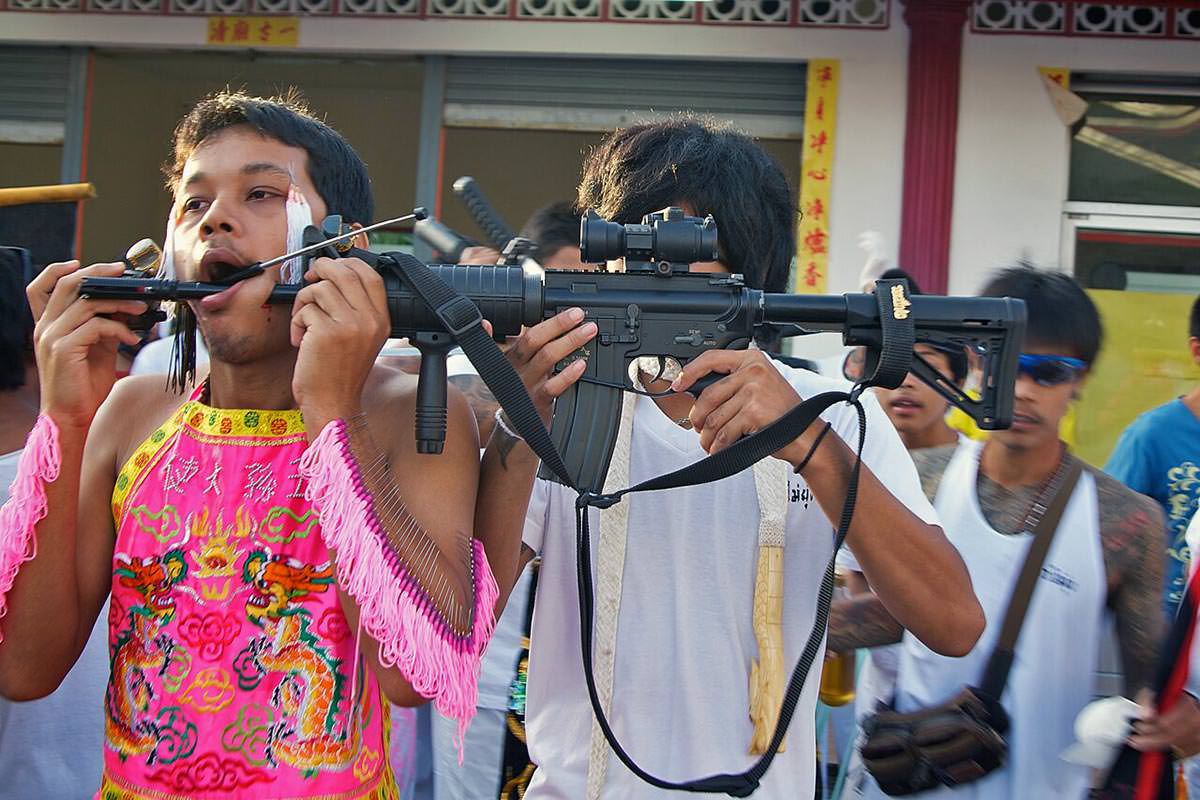
Where is Kathu?
Kathu is a district covering the green middle of Phuket Island, Thailand, halfway between Phuket Town (to the east) and Patong Beach (to the west).
Kathu sits in a lush valley framed by hills once rich with tin. Historically, it was the heart of the island’s mining industry.
In the 19th century, Chinese immigrants, mostly Hokkien from Fujian Province, arrived here to work the mines and build new lives. They brought with them their gods, rituals, and food. Over generations, their culture took deep root. Even today, a significant part of the Kathu population is Chinese.
Where to stay in Kathu? Kathu isn't the most touristy area of Phuket. But if you insist on staying closer to the birthplace of the Phuket Vegetarian Festival (especially to catch the early-morning rituals at Kathu Shrine), there are consideration-worthy Kathu accommodation options. Tinidee Golf Resort Phuket is one of Kathu's better-known mid-range hotels, combining good value with comfort. It can serve as a solid restful spot between festival processions. Compare prices for your dates on these direct links: Booking, Trip, Agoda, Expedia. Botan Boutique Hotel is another possible quiet place to stay in Kathu. Well-reviewed, comfortable, and affordable, with rooms featuring shared kitchen access. Check rates for the property here: Booking, Trip, Agoda. Of course, you can also choose to stay more centrally in Phuket Town, and catch the Kathu Shrine procession from there - like I did. Explore the most convenient accommodation options here.
Kathu Shrine History – 200 years of devotion
Kathu Shrine, also known as San Chao Kathu (內杼斗母宮), Aam Kathu, Lai Thu Tao Bo Keng, or Chai Tueng, was established in the early 1800s (probably 1817), during Phuket’s tin-mining boom.
The miners brought with them their ancestral Taoist practices, including devotion to the Nine Emperor Gods (Kiu Ong Tai Te), believed to control the elements and bring health, peace, and prosperity.
The shrine’s story is inseparable from the legend of a Chinese opera troupe. According to oral tradition, the troupe had been performing for the miners in a local Chinese theater. A large storm delayed their return home, and then a mysterious illness (likely malaria) struck. Following Taoist purification rites, the performers began a strict vegetarian fast and prayed to the Nine Emperor Gods for deliverance. When they recovered, the locals were impressed by the divine intervention.
In gratitude, the community invited the gods to reside permanently in Kathu and built a modest shrine to house the images of gods left by the opera troupe: Hiew Oi and Hiew Yian.
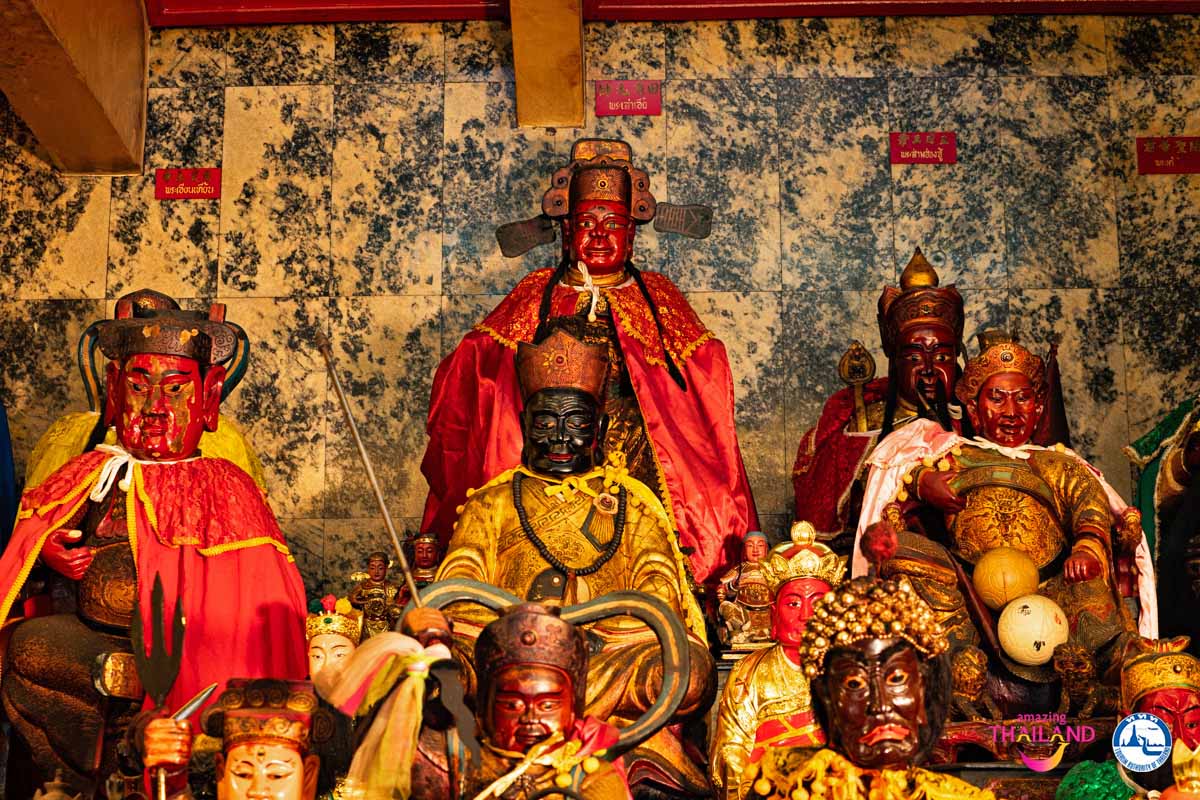
In 1825, the troupe brought additional statues, including Dianhu Nguan Soi or Kiew Ong Tai Te (the main Emperor God and, today, the principal deity of Kathu Shrine), Lee Lochia (the warrior deity), and Sam-Hu-Ong-Iah (Three Royal Lords, worshipped for healing and guidance). Arriving at what is today Saphan Hin, the gods were carried to Kathu Shrine, establishing the procession route and giving birth to the Phuket Vegetarian Festival.
Kathu Shrine’s first structure was simple, a wooden pavilion with a tin roof. Yet over time, it became a spiritual nucleus for the growing Chinese-Thai community.
Over the decades, the shrine expanded. It was rebuilt several times in brick, concrete, and gray marble, but it kept its modest, communal feel.
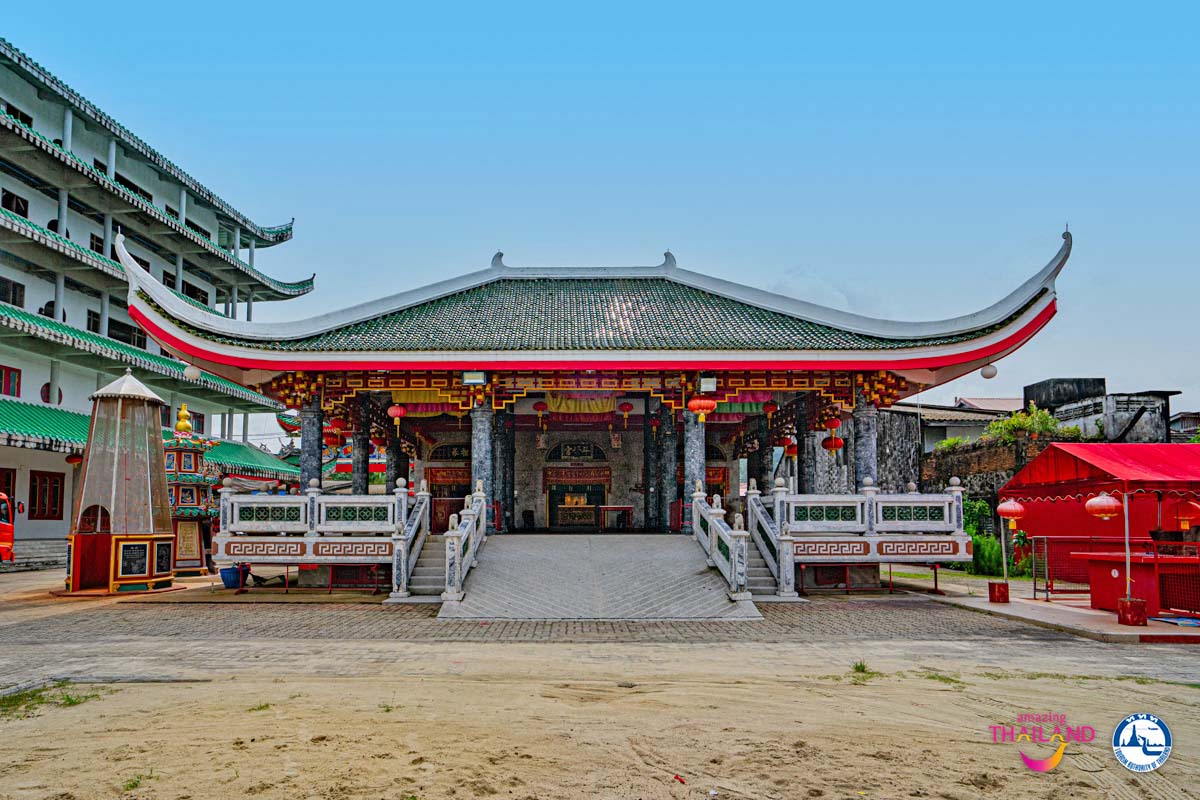
Unlike the larger, more ornate temples in Phuket Town, Kathu’s charm lies in its authentic connection to the island’s earliest waves of Chinese migration and devotion.
The shrine still houses early imports from China, including the original incense urn and a secret book of Taoist scriptures detailing how to organize the festival of abstinence and prayer, now known as the Phuket Vegetarian Festival (Tesagan Gin Jay).
Even as new shrines have emerged across Phuket, Kathu Shrine remains the spiritual axis of the event.
Nine Emperor Gods Festival Returning to the Roots
Two hundred years after that miraculous opera troupe healing, Kathu Shrine is still the heart of Phuket’s Vegetarian Festival, always listed first in the program, among the 39 participating shrines. The annual Kathu Shrine procession, therefore, comes under special scrutiny.
If you watch my footage of the 2024 Kathu Shrine walk through Phuket Town, you’ll see a usual array of spikes penetrating mediums’ faces, but also a collection of more exotic props – rulers, tree branches, fire extinguishers, heavy construction tools, and even a cluster of children’s helium balloons.
Watch the full uncut Kathu Shrine procession here!
“The festival began as gratitude, not entertainment”, insisted Mr. Prasert Khaokitpaisan, President of Kathu Shrine, speaking to Phuket News. “People saw their prayers answered. They made a vow to continue the tradition, and that vow has lasted 200 years. However, in the past 20 or 30 years, the elements used by the spirit mediums have become more and more extreme. Tourists expect something extreme, so some mediums push beyond what our ancestors intended. But this is not the true spirit of the Vegetarian Festival.”
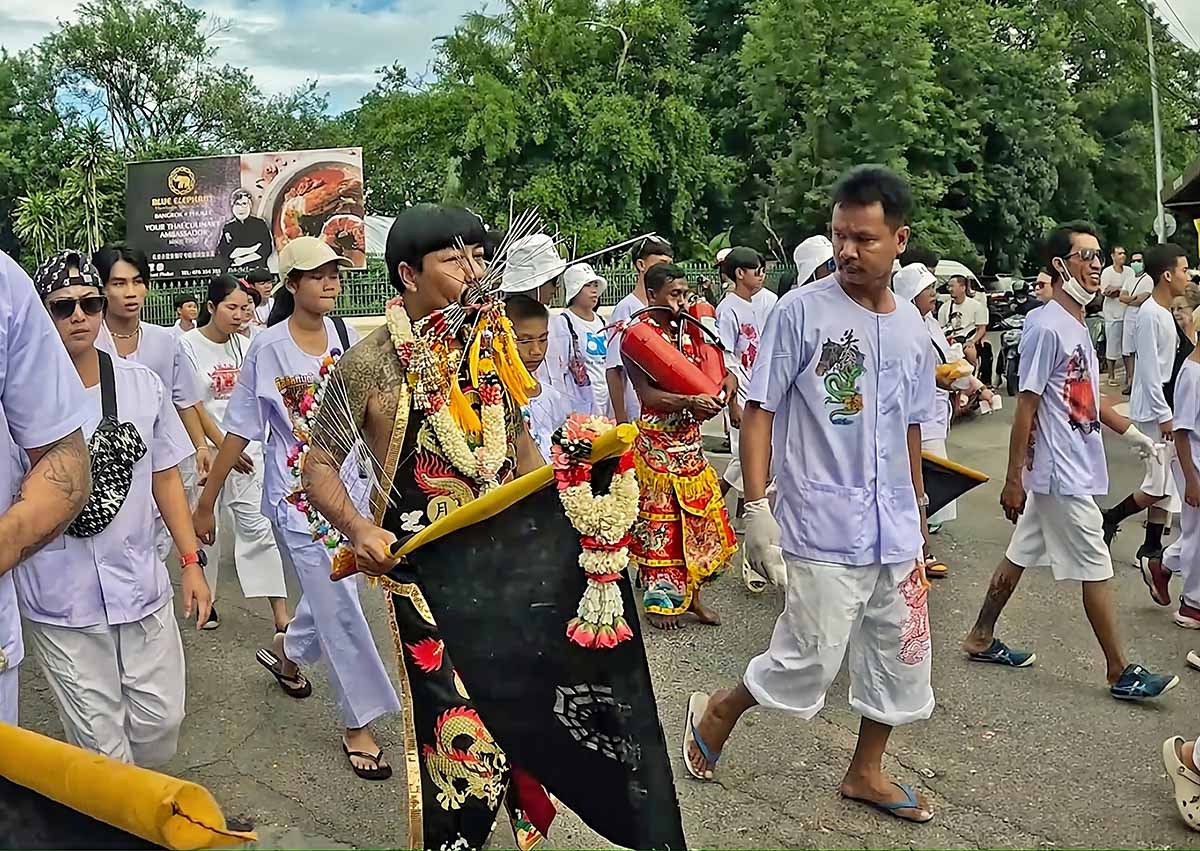
To return the Nine Emperor Gods Festival back on track and to its original healing purpose, especially during the mourning period for Thailand’s late Queen Sirikit, the Queen Mother, Kathu Shrine asked participants to tone it down. In this period of grief, noise levels were lowered, and ritual tools were limited to swords, knives, and needles no longer than an arm.
“When the spirits descend, the mediums lose awareness of their surroundings”, explained Kathu Shrine’s leader. “Using dangerous objects is not only disrespectful – it tortures the human body that carries the spirit. (…) Our ancestors built this festival to unite the community. We must now protect that unity, not divide it with competition or spectacle.”
For a piercing tradition on one Malaysian island, check out Thaipusam in Penang!
Kathu Shrine Procession Up Close
Walking since 6:45 am, when dawn just stretches its pale arms across the sky, a river of white-clad devotees flows towards smoky Saphan Hin, the open coastal park in southern Phuket. The route is approximately 10 kilometers one way, making the full round-trip journey a spiritual half-marathon.
A chain reaction of firecrackers tears open the morning, clashing with the cacophony of drums and bells. Among them, the ma songs, their bodies adorned, cheeks pierced with objects that defy belief – a purification ritual that looks like a spectacle of pain.
They were all chosen through a divination ritual called poi. In the Thai version of The Hunger Games, tributes’ names are written on slips of paper. Overseen by shrine elders, the process that may include tossing sacred wooden blocks or interpreting other divine signs, ensures that the most worthy candidates are chosen. If the selected person cannot commit, a member of their family has to take their place as ma song, the horse of the gods.
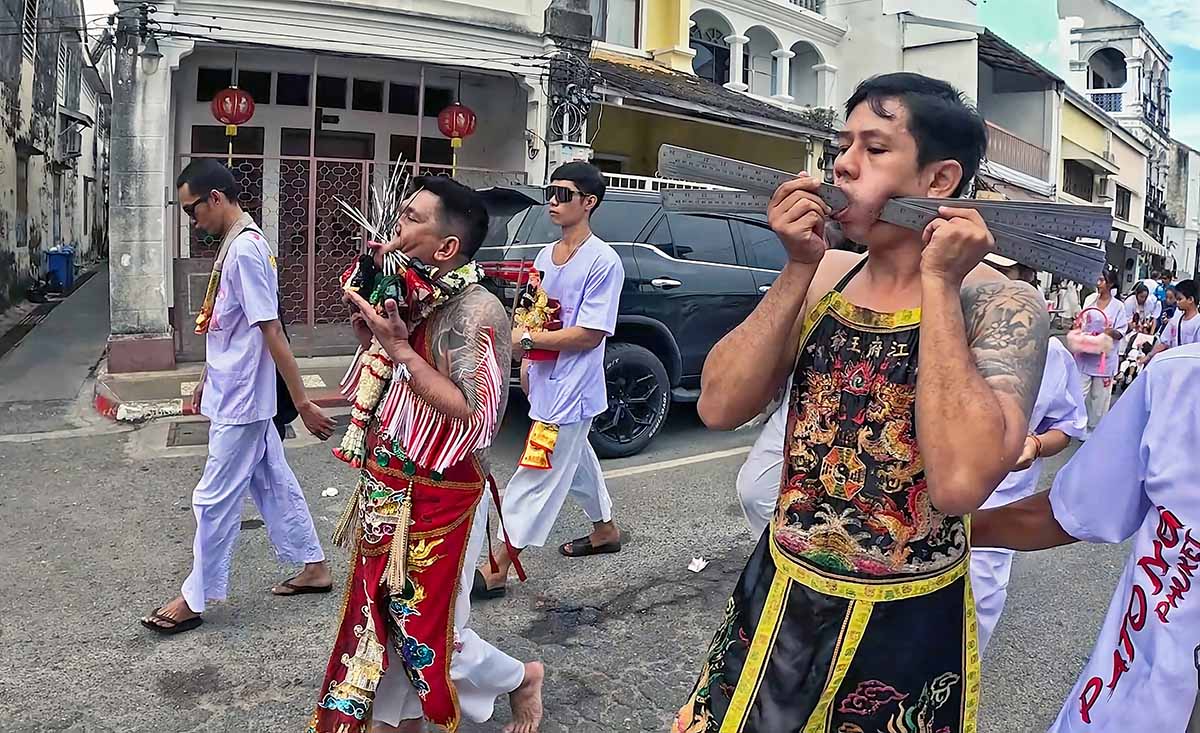
There is no payment for carrying the deity through flesh and spirit, only the privilege of channeling the gods and blessing the community aching for that divine encounter.
Residents and business owners line Phuket roads with altars of fruit and flowers, believing that interacting with ma songs will ward off misfortune, illness, or even a bit of romantic disappointment.
The climax of the Kathu Shrine procession comes with the passing of the Tu Lian, a large palanquin, the vehicle of the deity itself. Firecrackers explode at believers’ feet in a hypnotic rhythm, turning streets into a trembling chaos.
Kathu Shrine is known for blessings that deter illnesses and attract love. Though the spectacle can look terrifying, everyone wants to be caught in the sparks of this raw, living storm.
Nine Emperor Gods Festival – From Kathu to Catharsis
Whether subdued during a period of royal grief or guided by a renewed commitment to its early spiritual intentions, a deradicalized version of the Phuket Vegetarian Festival follows Kathu Shrine’s vision that pain can be relieved without insisting on shock.
“Eating vegetarian is about cleansing the mind and body, about compassion and peace. That’s the real purity we must protect”, explained Mr. Prasert.
Nine Emperor Gods Festival is a ritual that began in gratitude and endures in faith
Those nine days in the ninth month of the Chinese lunar calendar (depending on the year, falling in September or October) mean more than just abstaining from meat. Devotees also honor the Five Precepts: refraining from killing, stealing, lying, sexual misconduct, and intoxication.
Though temporary, this discipline offers moral lessons for the rest of the year too, strengthening the belief that renunciation can be an investment, bringing fortune not just to ourselves, but also to the community around us.
The white clothing, the vegetarian diet, the relentless devotion – all these elements contribute to a collective catharsis. It is a ritual that began in gratitude and endures in faith.
As the ma songs emerge from trance, leaving behind Phuket streets littered with red firecracker husks and over 22 million baht in tourism revenue, their eyes look past the crowd, focused on something beyond sight. Through the chaos, perhaps the idea of peace becomes more tangible.
What’s your take on Kathu Shrine’s procession during the Nine Emperor Gods Festival?
Comment below, and pin this article for later!
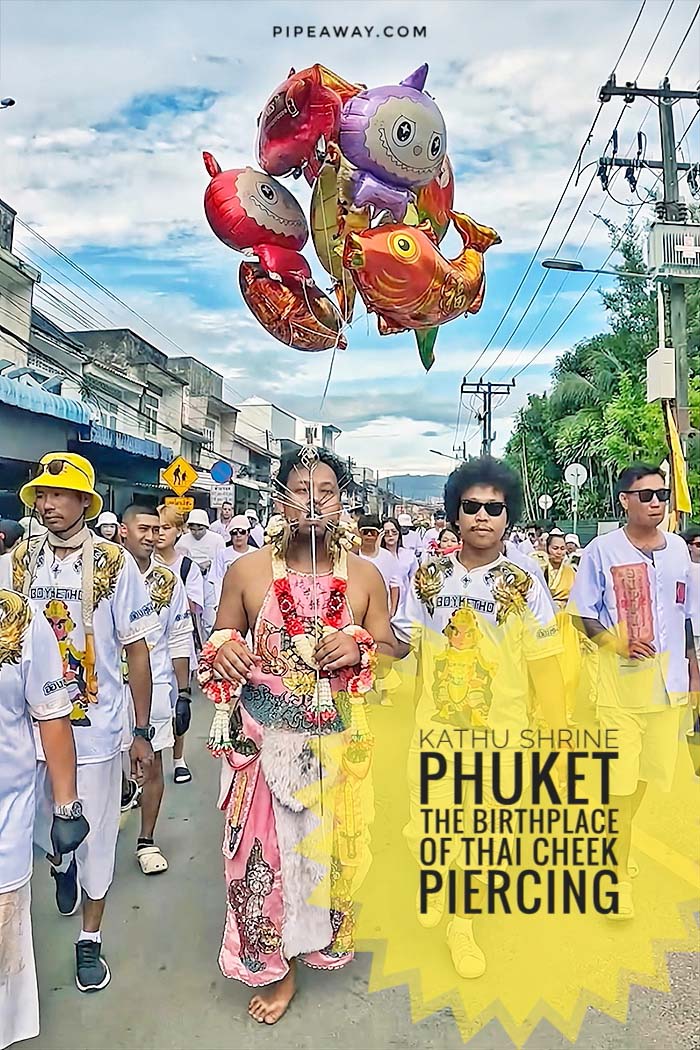
Disclosure: This post may contain affiliate links, meaning if you click on them and make a purchase, Pipeaway may make a small commission, at no additional cost to you. Thank you for supporting our work! The majority of photographs in this article are screenshots from Ivan Kralj's Pipeaway Walk video during the 2024 edition of the Phuket Vegetarian Festival. The exceptions are: Machine gun ma song - Joseph Ferris III, licensed under CC BY 2.0 Kathu Shrine deity figures and shrine exterior - copyright Tourism Authority of Thailand

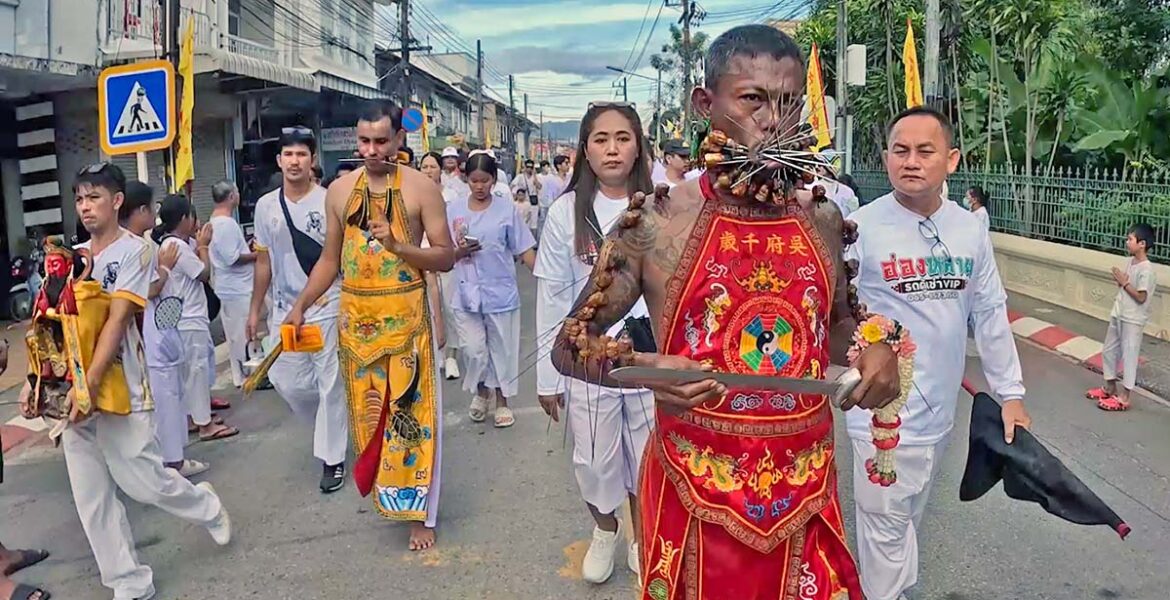

I’ve been to Thailand three times, but I haven’t yet had the chance to experience the Nine Emperor Gods Festival — and your post makes me realize how much I’ve been missing! The way you describe the atmosphere at Kathu Shrine feels so powerful and almost otherworldly. I can imagine the energy, the sounds, and the intensity of the rituals. Your photos are absolutely incredible — they capture the spirit, devotion, and emotion of this unique celebration so vividly. This is definitely going on my list for a future trip to Phuket.
Thank you so much, Agnes! 🙏
I’m really glad the story brought that atmosphere to life for you – it truly feels otherworldly when you’re there, somewhere between chaos and calm. The energy around Kathu Shrine processions is something you don’t just see – you absorb it.
Definitely add it to your list for the next trip! Just bring earplugs, an open heart, and maybe a spare white shirt or two 😉
I haven’t made it to Thailand yet, and would love to time a visit with the Nine Emperor Gods Festival to really immerse myself in the local culture.
That would be an incredible way to experience Thailand for the first time, Sonia!
The Nine Emperor Gods Festival shows such a raw and spiritual side of local culture – it’s intense, moving, and unforgettable.
You’ll never see “vegetarian” the same way again!
A spiritual half-marathon, love it. Festivals are always such a good way to experience local culture while traveling, and I more and more find myself planning trips around them.
Thanks for your comment, Alan!
The Kathu Shrine procession really does feel like a spiritual half-marathon – physically demanding, emotionally charged, and deeply communal.
I couldn’t agree more – timing a trip with a local festival always gives you a glimpse into the soul of a place.
I visited Phuket recently with friends, and by coincidence, it was during this festival. My friends had organized a tour of the island for us, and it included a stop at one of the shrines, but we didn’t see any of the body piercings or anything of the kind. I only learned about this later when I was researching a blog post on the festival. So the pictures in my post are going to be pretty tame compared to the pictures in your post! Absolutely extraordinary!
Thanks so much, Michael! 🙏
Phuket Vegetarian Festival really transforms the whole island, and honestly, there’s no wrong way to experience it.
I can understand that next to all the blessings and incense, you might have missed the dramatic devotional piercings.
However, I’m sure your post will still be incredibly valuable. If you need to borrow some visual materials, let me know. I have plenty 😉
Really appreciate your kind words, and can’t wait to read your write-up!